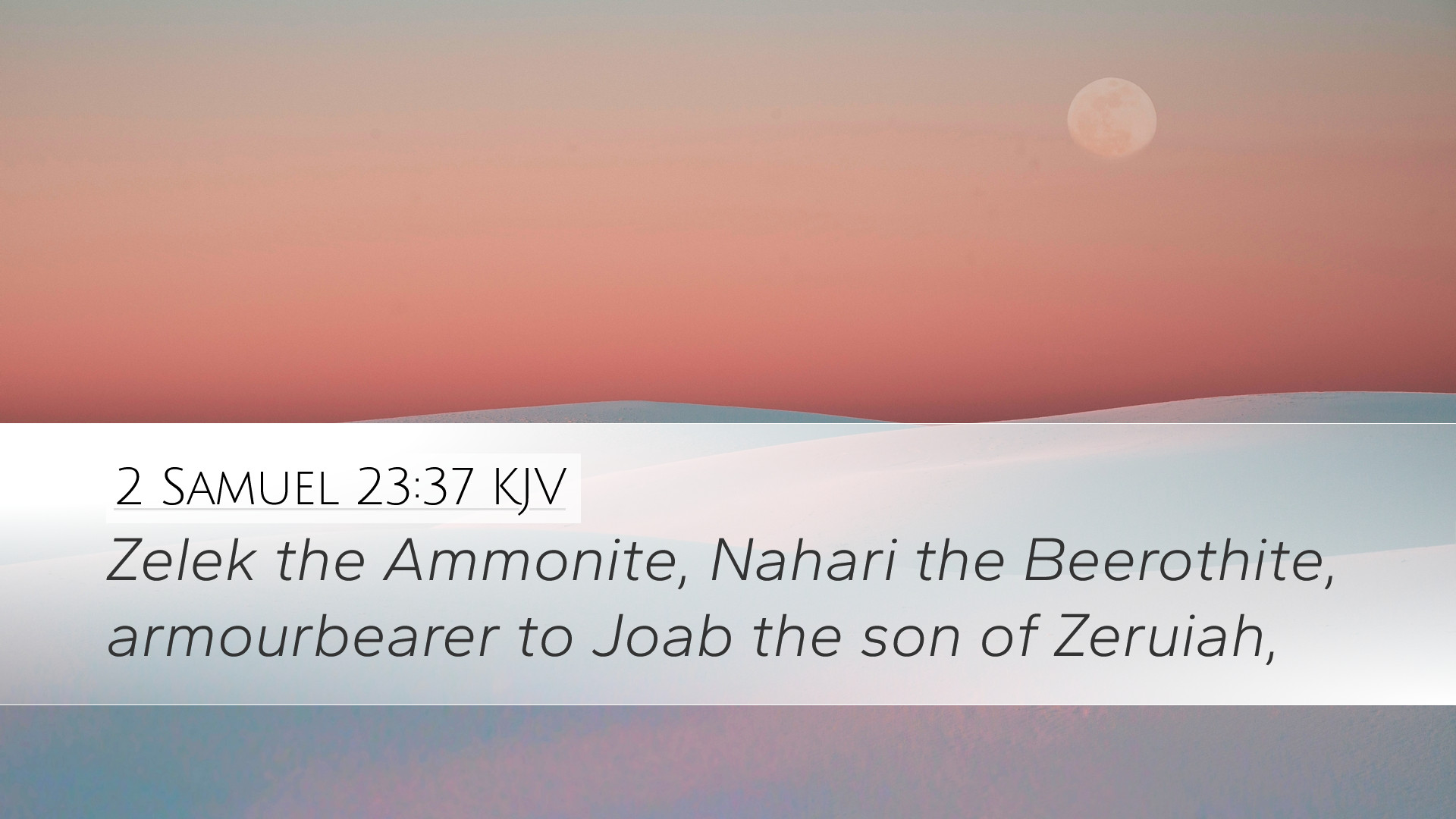Commentary on 2 Samuel 23:37
Verse Text: "Uriah the Hittite: thirty and seven in all."
Introduction
The mention of Uriah the Hittite in 2 Samuel 23:37, as part of King David's elite warriors, offers insights into characteristics vital for Christian leaders and followers. This commentary will explore the significance of Uriah amid David's mighty men, drawing from the profound insights of public domain commentaries by Matthew Henry, Albert Barnes, and Adam Clarke.
Contextual Background
Uriah the Hittite was not merely a soldier; his story intertwines with themes of loyalty, honor, and tragedy defined by David’s moral failure. Understanding Uriah's character is crucial in interpreting the sociopolitical and theological ramifications in the narrative of David's reign.
Historical Context
According to Matthew Henry, Uriah was one of the "thirty and seven" mighty men who displayed exceptional courage and commitment to King David. His inclusion among the elite signifies the value placed on valor and loyalty in ancient Israel. Additionally, Uriah's Hittite heritage points to the inclusivity of David's kingdom, where men from diverse backgrounds could rise to prominence.
Theological Significance
Albert Barnes emphasizes the moral implications surrounding Uriah’s narrative, particularly relating to David’s sin of adultery and subsequent orchestrated murder. This duality creates a poignant warning for leaders about the devastating consequences of moral failure and betrayal.
Character Analysis of Uriah the Hittite
Uriah, as depicted in the texts, exemplifies integrity and honor. His loyalty to David is evident even when he is unwittingly drawn into the king's tragic scheme.
Loyalty in Leadership
Uriah's loyalty serves as a contrast to David's actions. It encapsulates a fundamental principle of biblical leadership—the obligation to honor commitments, even when personal interests conflict. This point is thoroughly explored by Adam Clarke, who remarks that true servitude requires faithfulness, regardless of the personal cost.
Uriah as a Christological Figure
Some theological scholars draw parallels between Uriah and Jesus Christ, particularly regarding themes of suffering and innocence. Uriah’s unjust death at the behest of the king prefigures Christ’s sacrificial death resulting from the betrayal of those He came to save. This comparison invites reflection on the nature of sacrifice in both Old and New Testament contexts.
David’s Leadership Failures
The inclusion of Uriah in David’s list of mighty warriors starkly highlights David’s moral decline. The tragedy of Uriah’s situation raises critical questions about the nature of David as a leader.
Consequences of Sin
Matthew Henry articulates that David’s actions toward Uriah were not only a personal betrayal but also an affront to God’s laws. The text reminds us that the consequences of leadership failings can extend beyond the individual to affect an entire community.
Reflection for Modern Leaders
This narrative compels modern-day leaders, especially pastors and theologians, to reflect on their personal integrity and how their failings might influence those they lead. Albert Barnes calls for a righteous examination of one's motives, emphasizing humility, accountability, and the need for personal holiness.
Conclusion
The mention of Uriah the Hittite in 2 Samuel 23:37 serves as a profound reminder of the complexities within biblical narratives. It teaches vital lessons about loyalty, integrity, and the dire consequences of sin. For pastors, students, theologians, and scholars, Uriah’s story beckons a deeper reflection on the responsibilities of leadership, the importance of moral rectitude, and the overarching narrative of redemption found in Scripture.
Key Takeaways
- The significance of character in biblical accounts.
- The relationship between loyalty and integrity in leadership.
- The tragic consequences of moral failure.
- Christological reflections on sacrifice and innocence.
- The importance of accountability and personal holiness in leadership.


